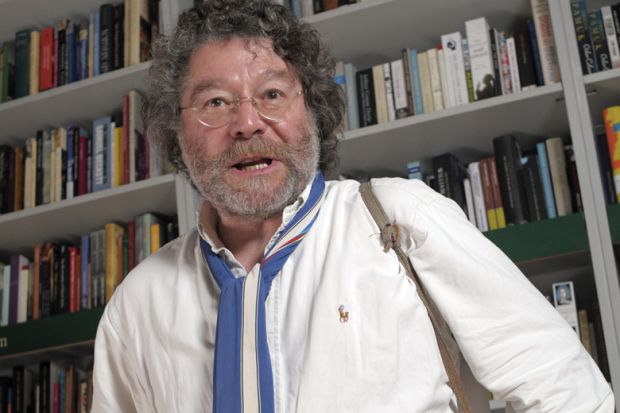Many Earth-turns ago, a Martian poet (Craig Raine) wrote that books made “the body to shriek without pain”. His Martian poetry school blossomed, its seeds scattering throughout the land. Today, the great sage Wiki names it a “minor movement” in which things are “described in a strange way”. Time, which in Martian poetry is something “tied to the wrist”, might be more kind. For Craig Raine still walks among us, a passionate and brilliant observer, and only sometimes shrieking at what he finds here.
In binocular mode, Raine’s book keeps one close eye on poems, always asking “what do they mean”, and guiding us carefully through the thickets of text, tone and echo. The other, glass eye – actually it’s Elizabeth Bishop’s grandmother’s – goes “off at an angle”, and takes in poetry’s place in culture, arts, politics and, ominously, in the hands of lazy and inept commentators.
It’s a wondrous eye – Raine’s real one – that delights in wandering the poem and, like Robert Frost, getting us a bit lost. Sometimes Raine summons T. S. Eliot to steer us back, his Virgil shadowing us a century after Prufrock. But sometimes we should just jump where Raine jumps. A tour of two paragraphs: Dr Johnson’s grousing about conceits in Abraham Cowley’s verse leads us to epic similes, and to the single, deferred and multiple orgasm; then, refreshed, we visit Longinus, Aristotle and John Dryden on metaphor, and meet Wapichan (“a major Guyanese dialect”) in which “kadakob, the word for ‘big-mouthed catfish,’ is sometimes used for ‘politician’”. As Robin Williams would say after an inspired riff, “Keep up!”
And Raine’s artificial eye? His telltale gaze dwells on the makers of muddled readings, pointless puzzles, deconstruction and purveyors of what he calls “balonium”. Looking for blood in a US election year? Raine’s elect features Josef Brodsky, fake; Christopher Ricks, pun-tormented; F. R. Leavis, moralistic; Glyn Maxwell, can’t scan. The chapter “Getting it Wrong” drags the critical works of Sean O’Brien, Tom Paulin and John Carey around the map of misreading. If our walk began with Thoreau, pointing to poetry’s delights, we’re then led by Dante round the murky Circle of Periphrasis.
The book boils over with catalogues: poetically “accurate” kisses compared in E. M. Forster, Anton Chekhov, Seamus Heaney, D. H. Lawrence and F. Scott Fitzgerald; ravens and crows in Milton, Ernest Hemingway, Shakespeare and Ted Hughes. Yet, after his poem Gatwick endured a trial by Twitter for depicting the “two foot span” of a lady’s “hefty can”, need Raine now list five authors describing women’s behinds as inverted heart-shapes? Further: are W. C. Williams’ stanzas in The Red Wheelbarrow really shaped like wheelbarrows? Is Bob Dylan really the father of rap (cf. The Last Poets and Gil Scott-Heron)? Shouldn’t W. B. Yeats’ Byzantium be interpreted in terms of his earlier poem (cf. Sailing to Byzantium)?
Raine values precision, and contends that “everything that is important about art is particular”, not Frenchified and fuzzy, a labyrinth of “semantic possibilities”. His own workings and associations are admirably eccentric; like William Blake’s The Mental Traveller, they show how “the eye altering, alters all”. Diverting, because diverted. Yet, when squinting at academic “nursery notions”, even Raine’s glass eye can fog with frustration. Robert Frost overprotects his interpretations by demanding: “put a sign up closed to all but me”. Is this book’s passion against misreading greater than its passion for poems?
David Gewanter is professor of English, Georgetown University. His latest collection of poetry is War Bird (2009).
My Grandmother’s Glass Eye: A Look at Poetry
By Craig Raine
Atlantic Books, 224pp, £25.00 and £9.99
ISBN 9781848872899 and 9781782397434 (e-book)
Published 10 May 2016




